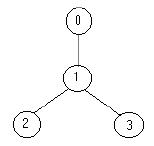Strategic game
| Time Limit: 2000MS | Memory Limit: 10000K | |
| Total Submissions: 9313 | Accepted: 4368 |
Description
Bob enjoys playing computer games, especially strategic games, but sometimes he cannot find the solution fast enough and then he is very sad. Now he has the following problem. He must defend a medieval city, the roads of which form a tree. He has to put the minimum number of soldiers on the nodes so that they can observe all the edges. Can you help him?
Your program should find the minimum number of soldiers that Bob has to put for a given tree.
For example for the tree:

the solution is one soldier ( at the node 1).
Your program should find the minimum number of soldiers that Bob has to put for a given tree.
For example for the tree:

the solution is one soldier ( at the node 1).
Input
The input contains several data sets in text format. Each data set represents a tree with the following description:
The node identifiers are integer numbers between 0 and n-1, for n nodes (0 < n <= 1500);the number_of_roads in each line of input will no more than 10. Every edge appears only once in the input data.
- the number of nodes
- the description of each node in the following format
node_identifier:(number_of_roads) node_identifier1 node_identifier2 ... node_identifiernumber_of_roads
or
node_identifier:(0)
The node identifiers are integer numbers between 0 and n-1, for n nodes (0 < n <= 1500);the number_of_roads in each line of input will no more than 10. Every edge appears only once in the input data.
Output
The
output should be printed on the standard output. For each given input
data set, print one integer number in a single line that gives the
result (the minimum number of soldiers). An example is given in the
following:
Sample Input
4 0:(1) 1 1:(2) 2 3 2:(0) 3:(0) 5 3:(3) 1 4 2 1:(1) 0 2:(0) 0:(0) 4:(0)
Sample Output
1 2
一句话题意:如果一个点上放士兵,那士兵相邻位置的路都会被看守住,现在问如果要把所有路都看守住,至少需要放多少士兵。
设dp[x][1],表示x放士兵,dp[x][0]表示x不放士兵
那么dp[x][1]+=min(dp[son][0],dp[son][1])
dp[x][0]+=dp[x][1];
。。。。。。。。。。。。。还有,记住找根,不是所以的点,都可以当根
#include<cstdio> #include<cstring> #include<algorithm> using namespace std; struct my{ int next; int v; }; const int maxn=3000+10; int adj[maxn],fa,dp[maxn][3],du[maxn]; my bian[maxn]; void myinsert(int u,int v){ bian[++fa].v=v; bian[fa].next=adj[u]; adj[u]=fa; } void dfs(int x){ if(adj[x]==-1) { dp[x][1]=1; dp[x][0]=0; return ; } for (int i=adj[x];i!=-1;i=bian[i].next){ int v=bian[i].v; dfs(v); dp[x][0]+=dp[v][1]; dp[x][1]+=min(dp[v][1],dp[v][0]); } } int main(){ int n,u,v,m; while(scanf("%d",&n)!=EOF){ memset(adj,-1,sizeof(adj)); memset(bian,-1,sizeof(bian)); memset(dp,0,sizeof(dp)); memset(du,0,sizeof(du)); fa=0; for (int k=1;k<=n;k++){ scanf("%d",&u); dp[u][1]=1; scanf(":(%d)",&m); for (int i=1;i<=m;i++){ scanf("%d",&v); myinsert(u,v); du[v]++; } } int root=0; for (int i=0;i<n;i++){ if(du[i]==0) {root=i;break;} } dfs(root); printf("%d ",min(dp[root][0],dp[root][1])); } return 0; }